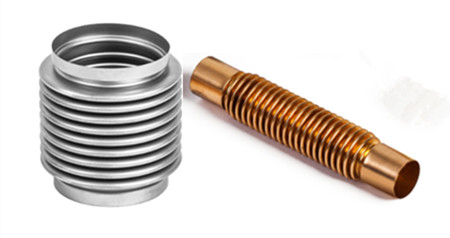The commonly used materials of metal bellows

Metallic bellows are wave-shaped tubes, also known as expansion or expansion joints. Metal bellows are elastic pipes that can be compressed or extended when pressure is applied to the outside of the pipe. When the pressure released and the material has not been stressed past its yield strength, the bellows will return to its original shape. The metal bellows are mainly used for non-concentric axial transmission with small bending radius, irregular turning, expansion or absorption of thermal deformation of pipes, etc., which is not convenient to connect pipes with pipes or connect pipes with equipment in the installation of fixed elbows.
Due to its excellent performance, it is widely used in automatic control and measuring instruments, vacuum technology, mechanical industry, electric power industry, transportation and atomic energy industry and other fields such as sensitive components, shock absorption components, non-concentric axial drive components, compensation components, sealing components, valve components and pipeline connections. Metal bellows should be selected according to the application and performance of different metal materials. The Common materials of metal bellows are carbon steel, copper, stainless steel, steel lined plastic, aluminum, titanium and so on. Today, lkalloy will discuss with you the common materials of metal bellows in details:
Copper alloy
Tin bronze C51900 ~ 0.1 X – 60 ℃ ~ + 100 ℃ metal bellows tube combined excellent flexibility and strength, has a good brazing and corrosion resistant performance. Hysteresis and elastic aftereffect are small and widely used as measuring elements.
Brass Bellows C24000 H – 60 ℃ ~ + 100 ℃ with low elasticity, large hysteresis and aftereffect, brazing sex is good.Can be used for non-corrosive media and precision is not high in the instrument as a measuring element.
Beryllium bronze Bellows C17510 P – 60 ℃ ~ + 150 ℃, nonmagnetic, have a very small hysteresis and elastic aftereffect, high flexibility, corrosion resistance, used for high precision measuring instrument.
Stainless steel
Bellows SUS321 G – 194 ℃ ~ + 400 ℃ has the very high bending fatigue strength and corrosion resistance, good welding performance, can be used as a measure of corrosive medium, sealing, connection and compensating element. Common brands are 304, 304L, 316, 316L, 317L, 310S, 321, etc. There are more special, high corrosion resistant of 6Mo special stainless steel (super stainless steel) such as 254SMO, 904L, N08367 or N08926. Duplex stainless steel offers high strength but poor elongation, it’s not recommended for small bellows, large bellows processing can be considered according to the technical conditions.
Nickel-based alloy
High corrosion and high-temperature conditions should take into account the resistance to chloride ions, sea water, acid, alkali corrosion and high temperature resistant alloy materials, such as high nickel alloy, nickel ferrochrome alloys such as Incoloy 800H, Incoloy 825, Inconel 625, Monel400 and alloy c-276.
Titanium
Generally, it is pure titanium Gr.1. It has high elongation while poor welding performance, which should be taken into consideration.


